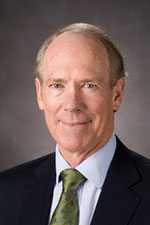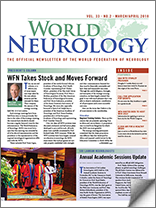This, my second column, is to inform you of some important steps taken by the new administration and the rationale for these. They comprise the essence of the strategy meeting held Feb. 12-13 in London.

William Carroll, MD
Such strategy meetings have been held from time to time previously. But due to the value of this strategy meeting, the trustees have decided it should become a regular biennial event for this administration. The World Federation of Neurology (WFN) was most fortunate that this meeting was attended by all of its elected representatives and the presidents or the representatives of the regional neurological organizations affiliated with the WFN.
These included Prof. Yomi Ogan, president of the newly formed African Academy of Neurology; Prof. Riadh Gouider, representing Prof. Chokri Mhiri , president of the Pan Arab Union of Neurological Societies; Prof. Marco Medina, president of the Pan American Federation of Neurological Societies; and Prof. Boon Soek Jeon, president of the Asian Oceanian Association of Neurology. We were also especially honored to have Prof. Ralph Sacco, president of the American Academy of Neurology, and Prof. Franz Fazekas, president-elect of the European Academy of Neurology and representing Prof. Gunther Deuschl.
New Committee Chairs
| Nominating Committee | Prof. Hidehiro Mizusawa |
| Constitution and Bylaws Committee | Prof. Phil Smith |
| Finance Committee | Prof. Bo Norrving |
| Regional Liaison Committee | Prof. Ralph Sacco |
| Publications Committee | Prof. John England |
| Public Awareness and Advocacy Committee | Prof. Tissa Wijeratne |
| Education Committee | Prof. Steven Lewis |
| Standards and Evaluations Committee | Prof. Jan Kuks |
| Membership Committee | Prof. Morris Freedman |
| Applied Research Committee | Prof. Albert Ludolph |
| Congress Committee | Prof. Ryuji Kaji |
| E-Communications Committee | Prof. Walter Struhal |
Over two days, all WFN activities were discussed, evaluated, and had action plans developed to proceed for each. All such plans were carefully scrutinized by Prof. Richard Stark, WFN treasurer. While the WFN activities have been largely centered on education in neurology, the WFN must ensure that such programs are not only properly established with oversight and clear communication channels but they must be financially sustainable and have clear and measurable outcomes. Through the careful diligence, foresight, and enterprise of the strategy meeting attendees, we have largely attained this goal. It was with much pleasure that I was able to observe enthusiastic contribution of all participants and a most successful outcome.
Here are the items that I believe to be of most interest to the membership.
Education
Regional Training Centers. There are five centers that are presently operating; four in Africa and one in Mexico. A proposition was received from Bangalore for which the WFN was most grateful.
The strategy meeting participants considered that the Asian proposition was different than that developed for Africa and required careful review by the Education Committee to clearly define the goals, location, collaborative organization, and the funding and outcome measures before proceeding. It is hoped this review will be completed quickly.
Regional Teaching Courses. These are predominantly held in Africa at the present time through a collaboration of the EAN, WFN, and specialty groups, such as the WSO, the MDS, and this year ECTRIMS. One proposition that was considered to have some merit was the linking of every second regional teaching course in Africa with the African Academy of Neurology.
The African Academy of Neurology is of fundamental importance, and this nascent but most essential development may require its organizational structure to be nurtured for the time being. Having a formal relationship in place facilitates its growth.
World Congress of Neurology (WCN). The Scientific Program Committee and Teaching Course Committee for the 2019 WCN, to be held in Dubai, will meet during the upcoming AAN meeting in Los Angeles. Under Prof. Chris Kennard and Prof. Steven Lewis, the program development is ahead of schedule.
We all remember the wonderful 2015 WCN held in Santiago, Chile. Notices have gone out to member national societies asking for nominations for the 2023 venue. In this year, the WCN is again scheduled to be hosted in the Americas. This WFN region encompasses North America (Canada and the U.S.), Central America, and South America.
Junior Traveling Fellowships. Applications closed after the receipt of 82 requests for one of 30 JTFs, each valued at GBP1,000. Applicants will be advised of the results shortly.
Grants. It was determined at the strategy meeting that these should be more focused and targeted with two principal aims. First, to provide young neurologists with the opportunity and funds to undertake a piece of original research. Second, that the research would result in both a publication for the author and provide data with which to launch a larger project or direct local resources to areas of need. Six grants of up to
U.S. ($) 25,000 to a maximum total of U.S. ($) 100,000 will be available this year. For more details, please refer to the grant announcement on page 5 of this issue of World Neurology.
Structure and Visibility
The London office has been relocated to a larger space within its present location in Chester house in Fulham. The office staff will continue to be led by Laura Druce and assisted by Jade Levy (nee Roberts) and Carlos Hunte and with Chiu Keung Man providing valuable IT support. Chiu will also review all electronic media to harmonize the WFN logo and livery across the website and all communication platforms (Facebook, Twitter, and the website) as well as Office Communications and all WCN material. He is also completing the insertion of the newly promulgated EU General Data Privacy Regulations into all the WFN member information.
A new committee, the e-Communications Committee, will oversee these activities and will be chaired by Prof. Walter Struhal. A subgroup of this committee, aided by Profs. Wolfgang Grisold, Morris Freedman, and Riadh Gouider, are preparing a paper on e-learning to guide the WFN on this aspect.
The new committee members will be posted on the WFN website shortly. The roles and charges for each committee will be updated by the new committees. On behalf of the trustees, I offer my thanks and congratulations on those who have assumed new roles. I also offer my most sincere thanks to those who have completed their two-year terms for jobs well done.
With increasing activities to be managed by the London Office and the WFN committees, Prof. Wolfgang Grisold, the secretary-general, is preparing a “universal calendar.” It is envisaged that this will contain the timelines for all routine office activities and those for all committees each year. It will be an important e-document that will be relatively easy to revise and update as required and to which the Standard Operating Procedures (SOP) for each and every function will be able to be added. It is hoped that this will aid the efficiency of the office for day-to-day work and its “corporate memory.”
With this base, the WFN will be in a position to explore and expand its educational and other activities.
